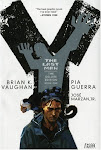
The dots, in this case, could be the approximate decade between the end of the initial punk movement and the rise of Nirvana and mainstream, MTV-frequenting alternative music. The dots could also be the substantial periods of time elapsed between my tackling of chapters in Michael Azerrad's
Our Band Could Be Your Life: Scenes from the American Indie Underground 1981-1991.My brother-in-law Andy lent me a first edition, published in 2001, either that year or in 2002 while vacationing with family in Sea Isle City, N.J. I'm pretty sure I knocked out the first two chapters on Black Flag and the Minutemen down the shore, but it was the summer of 2006, waiting for the PECO man to turn on electricity and gas in my new apartment, before I finished the third chapter on Mission of Burma. It was more than another year before I determined to finish, and another shore vacation and a New England trip via train offered the opportunity.
Far from a tough read though, once you start you want to keep proceeding from band to band. Thinking I had to allot the time for such an effort may have kept me from picking it up sooner. Luckily, Azerrad keeps noting the connections and citing history as the paths of the bands overlap. So some time between reading doesn't hurt too bad.
While I think Nirvana was great, the band wasn't blazing new ground. They were there with the right sound at the right time. They wouldn't have been there without the bands chronicled in Our Band, however. They were blazing the trails, not only musically, but also in establishing national touring circuits, their own distribution methods and, maybe most importantly, creating a lasting community based in the music. Punks most media outlets forgot about with the Sex Pistols done, the advent of MTV, and more easily reported stories to cover.
In his introduction Azerrad acknowledges there were many more bands, labels etc. that made significant contributions in the discussed time period, but he narrowed his focus to the best and most influential bands. Aside from the three already mentioned, he covers Minor Threat, Husker Du, the Replacements, Sonic Youth, Butthole Surfers, Big Black, Dinosaur Jr., Fugazi, Muddhoney and Beat Happening.
I'd read or seen a good deal about Black Flag, Minor Threat and Fugazi, and their presence in this book no doubt confirmed my interest in it. But I probably most enjoyed the chapters on the bands lesser-known to me, and those I only knew by name. And in the case of Butthole Surfers, a band I really had no interest in reading about. The Surfers chapter however, including an account of a raving drunk Gibby Haynes at a Netherlands festival, is not to be missed. Those guys are nuts.
The thoroughly researched parts make an entertaining whole, and the importance and impact of the bands discussed is continually emphasized. You can't help but be awed at the artistic feats and cultural accomplishments of these young men and women, but with any writing about punk bands, it's the minutia of the van rides and barely attended gigs that provide the most entertainment.
Guess I can give the book back now.
 Employing a thorough, journalistic style, author Jon Krakauer does a great job chronicling the road odyssey and last days of Chris McCandless in Into the Wild.
Employing a thorough, journalistic style, author Jon Krakauer does a great job chronicling the road odyssey and last days of Chris McCandless in Into the Wild.


